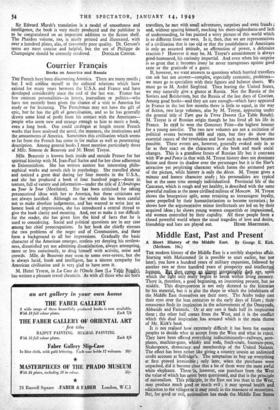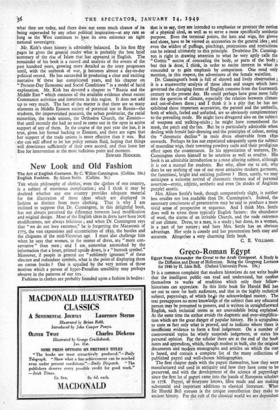Middle East, Past and Present
A Short History of the Middle East. By George E. Kirk. (Methuen. 16s.) THE modern history of the Middle East is a terribly shapeless affair. Starting with Mohammed (it is possible to start earlier, but not later), you have a hundred years of military expansion, followed by another two or three hundred years of prosperity and intellectual icaukcutk Aka. thca, cg 4101Re 4pterpip431* dark age, upon which the light only really begins to break within living memory. There is, therefore, a good beginning, an interesting present, but no middle. This disproportion is not only dictated to the historian by his material, but it is also the shape in which the inhabitants of the Middle East themselves see their story. The Arabs today cast their eyes over the lean centuries to the early days of Islam ; their renascence finds its inspiration in the achievements of the Omayyads, Abbasids and Fatimids. Or at any rate it finds half its inspiration thew' the other half comes from the West, and it is the conflict which this dual inspiration has aroused which is the main theme of Mr. Kirk's book.
It is not realised how extremely difficult it has been for eastern peoples to decide what to accept from the West and what to reject. They have been offered everything indiscriminately—railways, aero- planes, machine-guns, whisky and soda, frock-coats, fountain-pens, Shakespeare, democracy and membership of the United Nations. The effect has been rather like giving a country cousin an unlimited credit account at Selfridge's. The temptation to buy up everything at first proved irresistible ; only later, when the purchases were unpacked, did it become clear that a lot of them were the most awful white elephants. There 'is, however, one purchase from the West the value of which has never been questioned, and that is the principle of nationalism. This priilciple, in the East not less than in the West, may produce much good or much evil ; it may spread health and education to the villages,or it may result in the massacre of minorities. But, for good or evil, nationalism has made the Middle East States
what they are today, and there does not seem much chance of its being superseded by any other political inspiration—at any rate as long as the West continues to base its own existence on tight national sovereignty.
Mr. Kirk's short history is admirably balanced. In his first fifty pages he gives the general reader what is probably the best brief 'summary of the rise of Islam that has appeared in English. The remainder of his book is a record and analysis of the events of the past hundred years, growing more detailed as the story progresses until, with the outbreak of war, it becomes almost a day-to-day political record. He has succeeded in producing a clear and exciting narrative of these last complicated years, and his chapter on " Present-Day Economic and Social Conditions " is a model of lucid explanation. Mr. Kirk has devoted a chapter to " Russia and the Middle East " which contains all the available evidence about recent Communist activities and intentions in this region. It does not add up to very much. The fact of the matter is that there are so many elements in Middle Eastern society of potential use to Russia—the students, the impoverished peasants, the urban proletariat, the racial minorities, the trade unions, the Orthodox Church, the Zionists— that until recently she had no need to come out in the open in active support of any of them. In the course of the past year she has, it is true, given her formal backing to Zionism, and there are signs that her support of the trade unions is more effective than it was. But she can still afford to let her policy remain fluid, hoping that things will deteriorate sufficiently of their own accord, and thus leave her free for intervention at the most iudicious point and moment. EDWARD HODGKIN.



































 Previous page
Previous page